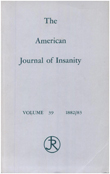Psychiatric disorders and functional disability in outpatients with traumatic brain injuries
Abstract
OBJECTIVE: This study examined psychiatric sequelae of traumatic brain injuries in outpatients and their relation to functional disability. METHOD: Fifty consecutive outpatients with traumatic brain injuries who came to a brain injury rehabilitation clinic for initial evaluation were examined for DSM-III-R diagnoses with the use of the National Institute of Mental Health Diagnostic Interview Schedule. The patients completed the Medical Outcomes Study Health Survey to assess functional disability and a questionnaire to assess postconcussion symptoms and self-perceptions of the severity of their brain injuries and cognitive functioning. RESULTS: Thirteen (26%) of the patients had current major depression, and an additional 14 (28%) reported a first-onset major depressive episode after the injury that had resolved. Twelve (24%) had current generalized anxiety disorder, and four (8%) reported current substance abuse. The group with depression and/or anxiety was significantly more impaired than the nondepressed/nonanxious patients according to the Medical Outcomes Study Health Survey measures of emotional role functioning, mental health, and general health perceptions. The depressed/anxious group also rated their injuries as significantly more severe and their cognitive functioning as significantly worse, despite the lack of significant differences in objective measures of severity of injury and Mini-Mental State examination scores. The depressed patients reported significantly more postconcussion symptoms that were increasing in severity over time. CONCLUSIONS: Depression and anxiety are common in outpatients with traumatic brain injuries. Patients with depression or anxiety are more functionally disabled and perceive their injury and cognitive impairment as more severe. Depressed patients report more increasingly severe postconcussion symptoms.
Access content
To read the fulltext, please use one of the options below to sign in or purchase access.- Personal login
- Institutional Login
- Sign in via OpenAthens
- Register for access
-
Please login/register if you wish to pair your device and check access availability.
Not a subscriber?
PsychiatryOnline subscription options offer access to the DSM-5 library, books, journals, CME, and patient resources. This all-in-one virtual library provides psychiatrists and mental health professionals with key resources for diagnosis, treatment, research, and professional development.
Need more help? PsychiatryOnline Customer Service may be reached by emailing [email protected] or by calling 800-368-5777 (in the U.S.) or 703-907-7322 (outside the U.S.).



